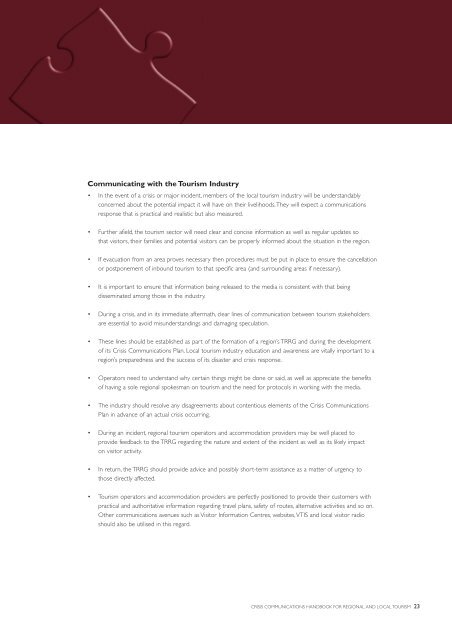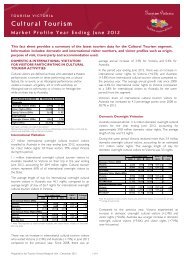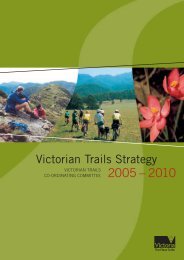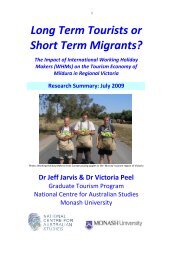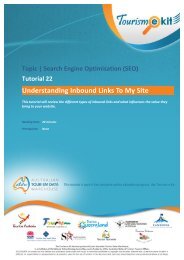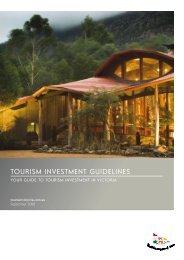Crisis Communications Handbook for Regional ... - Tourism Victoria
Crisis Communications Handbook for Regional ... - Tourism Victoria
Crisis Communications Handbook for Regional ... - Tourism Victoria
Create successful ePaper yourself
Turn your PDF publications into a flip-book with our unique Google optimized e-Paper software.
Communicating with the <strong>Tourism</strong> Industry<br />
• In the event of a crisis or major incident, members of the local tourism industry will be understandably<br />
concerned about the potential impact it will have on their livelihoods.They will expect a communications<br />
response that is practical and realistic but also measured.<br />
• Further afield, the tourism sector will need clear and concise in<strong>for</strong>mation as well as regular updates so<br />
that visitors, their families and potential visitors can be properly in<strong>for</strong>med about the situation in the region.<br />
• If evacuation from an area proves necessary then procedures must be put in place to ensure the cancellation<br />
or postponement of inbound tourism to that specific area (and surrounding areas if necessary).<br />
• It is important to ensure that in<strong>for</strong>mation being released to the media is consistent with that being<br />
disseminated among those in the industry.<br />
• During a crisis, and in its immediate aftermath, clear lines of communication between tourism stakeholders<br />
are essential to avoid misunderstandings and damaging speculation.<br />
• These lines should be established as part of the <strong>for</strong>mation of a region’s TRRG and during the development<br />
of its <strong>Crisis</strong> <strong>Communications</strong> Plan. Local tourism industry education and awareness are vitally important to a<br />
region’s preparedness and the success of its disaster and crisis response.<br />
• Operators need to understand why certain things might be done or said, as well as appreciate the benefits<br />
of having a sole regional spokesman on tourism and the need <strong>for</strong> protocols in working with the media.<br />
• The industry should resolve any disagreements about contentious elements of the <strong>Crisis</strong> <strong>Communications</strong><br />
Plan in advance of an actual crisis occurring.<br />
• During an incident, regional tourism operators and accommodation providers may be well placed to<br />
provide feedback to the TRRG regarding the nature and extent of the incident as well as its likely impact<br />
on visitor activity.<br />
• In return, the TRRG should provide advice and possibly short-term assistance as a matter of urgency to<br />
those directly affected.<br />
• <strong>Tourism</strong> operators and accommodation providers are perfectly positioned to provide their customers with<br />
practical and authoritative in<strong>for</strong>mation regarding travel plans, safety of routes, alternative activities and so on.<br />
Other communications avenues such as Visitor In<strong>for</strong>mation Centres, websites,VTIS and local visitor radio<br />
should also be utilised in this regard.<br />
CRISIS COMMUNICATIONS HANDBOOK FOR REGIONAL AND LOCAL TOURISM 23


